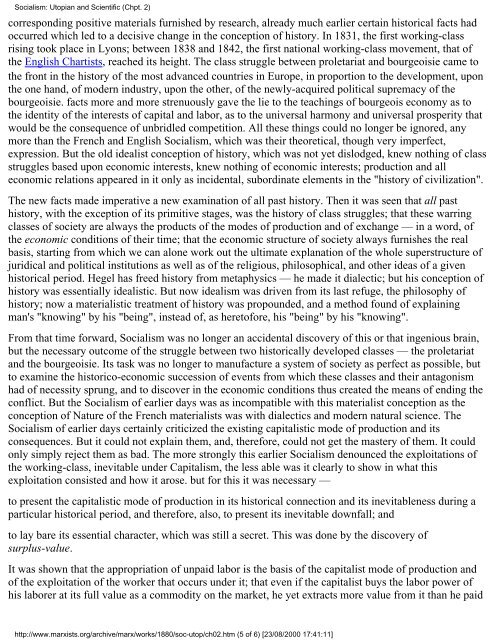Socialism: Utopian and Scientific - MIA
Socialism: Utopian and Scientific - MIA
Socialism: Utopian and Scientific - MIA
You also want an ePaper? Increase the reach of your titles
YUMPU automatically turns print PDFs into web optimized ePapers that Google loves.
<strong>Socialism</strong>: <strong>Utopian</strong> <strong>and</strong> <strong>Scientific</strong> (Chpt. 2)corresponding positive materials furnished by research, already much earlier certain historical facts hadoccurred which led to a decisive change in the conception of history. In 1831, the first working-classrising took place in Lyons; between 1838 <strong>and</strong> 1842, the first national working-class movement, that ofthe English Chartists, reached its height. The class struggle between proletariat <strong>and</strong> bourgeoisie came tothe front in the history of the most advanced countries in Europe, in proportion to the development, uponthe one h<strong>and</strong>, of modern industry, upon the other, of the newly-acquired political supremacy of thebourgeoisie. facts more <strong>and</strong> more strenuously gave the lie to the teachings of bourgeois economy as tothe identity of the interests of capital <strong>and</strong> labor, as to the universal harmony <strong>and</strong> universal prosperity thatwould be the consequence of unbridled competition. All these things could no longer be ignored, anymore than the French <strong>and</strong> English <strong>Socialism</strong>, which was their theoretical, though very imperfect,expression. But the old idealist conception of history, which was not yet dislodged, knew nothing of classstruggles based upon economic interests, knew nothing of economic interests; production <strong>and</strong> alleconomic relations appeared in it only as incidental, subordinate elements in the "history of civilization".The new facts made imperative a new examination of all past history. Then it was seen that all pasthistory, with the exception of its primitive stages, was the history of class struggles; that these warringclasses of society are always the products of the modes of production <strong>and</strong> of exchange — in a word, ofthe economic conditions of their time; that the economic structure of society always furnishes the realbasis, starting from which we can alone work out the ultimate explanation of the whole superstructure ofjuridical <strong>and</strong> political institutions as well as of the religious, philosophical, <strong>and</strong> other ideas of a givenhistorical period. Hegel has freed history from metaphysics — he made it dialectic; but his conception ofhistory was essentially idealistic. But now idealism was driven from its last refuge, the philosophy ofhistory; now a materialistic treatment of history was propounded, <strong>and</strong> a method found of explainingman's "knowing" by his "being", instead of, as heretofore, his "being" by his "knowing".From that time forward, <strong>Socialism</strong> was no longer an accidental discovery of this or that ingenious brain,but the necessary outcome of the struggle between two historically developed classes — the proletariat<strong>and</strong> the bourgeoisie. Its task was no longer to manufacture a system of society as perfect as possible, butto examine the historico-economic succession of events from which these classes <strong>and</strong> their antagonismhad of necessity sprung, <strong>and</strong> to discover in the economic conditions thus created the means of ending theconflict. But the <strong>Socialism</strong> of earlier days was as incompatible with this materialist conception as theconception of Nature of the French materialists was with dialectics <strong>and</strong> modern natural science. The<strong>Socialism</strong> of earlier days certainly criticized the existing capitalistic mode of production <strong>and</strong> itsconsequences. But it could not explain them, <strong>and</strong>, therefore, could not get the mastery of them. It couldonly simply reject them as bad. The more strongly this earlier <strong>Socialism</strong> denounced the exploitations ofthe working-class, inevitable under Capitalism, the less able was it clearly to show in what thisexploitation consisted <strong>and</strong> how it arose. but for this it was necessary —to present the capitalistic mode of production in its historical connection <strong>and</strong> its inevitableness during aparticular historical period, <strong>and</strong> therefore, also, to present its inevitable downfall; <strong>and</strong>to lay bare its essential character, which was still a secret. This was done by the discovery ofsurplus-value.It was shown that the appropriation of unpaid labor is the basis of the capitalist mode of production <strong>and</strong>of the exploitation of the worker that occurs under it; that even if the capitalist buys the labor power ofhis laborer at its full value as a commodity on the market, he yet extracts more value from it than he paidhttp://www.marxists.org/archive/marx/works/1880/soc-utop/ch02.htm (5 of 6) [23/08/2000 17:41:11]














![tyf Enf=O=n]lgg](https://img.yumpu.com/47584932/1/190x245/tyf-enfonlgg.jpg?quality=85)

